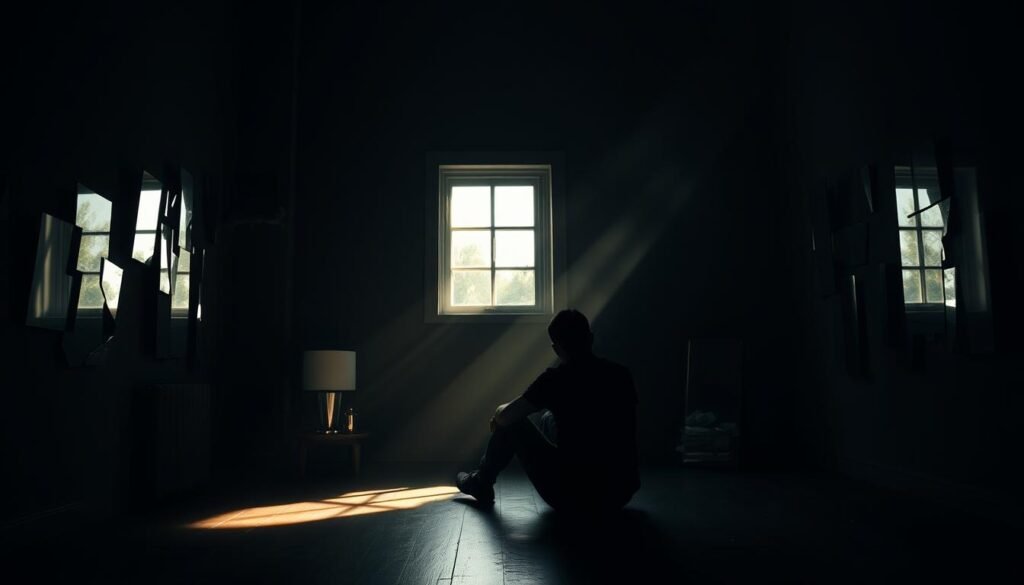Did you know a shocking 80% of people under 18 and 40% over 65 feel lonely sometimes? This fact highlights how depression and loneliness greatly affect our mental health. Many are looking for hope and real connections in tough times. Feeling both depressed and lonely can be very hard. But, admitting these feelings is the first step to getting better.
Today, many struggle with bad sleep, eating changes, and always feeling sad. It’s important to use spiritual, emotional, and social help to face these issues. This article will discuss the link between depression and loneliness. It shows how asking for help can build strength and help healing.
Key Takeaways
- Loneliness is a common problem for both young and old.
- Age and where you live can make loneliness worse.
- Feeling lonely can lead to depression and mental health issues.
- It’s key to seek out emotional and spiritual support when isolated.
- Noticing signs of loneliness and depression is important for getting help early.
The Connection Between Depression and Loneliness
The link between depression and loneliness is complex. These emotions can trap and enhance one another. Loneliness often affects mental health deeply, leading to a cycle. This cycle makes isolation worsen depressive symptoms. Many studies have shown that people with depression feel disconnected from loved ones. This makes their fight against depression and loneliness harder.
During the COVID-19 pandemic, many in the UK felt more anxious or depressed, with rates between 16-28%. In Ireland, 27.7% showed signs of anxiety or depression during early lockdown. A shocking one-third linked their depression to loneliness caused by the pandemic.
These emotions’ depth can be unsettling. Stress hormones like cortisol play a big role in mental health. The impact of isolation is clear. Studies have found that real-life talks with friends or family can lessen loneliness. This is something online chats can’t fully do. Understanding this link helps in creating better support for those dealing with depression.
It’s vital to understand this connection to help people recover. Dealing with loneliness can boost mental health and prevent depression. Programs like social prescribing and community projects can ease these feelings. They build connections that improve mental well-being.
Understanding Depression: Symptoms and Causes
Depression is a common mental health issue, affecting about one in six people sometime in their lives. Every year, around 16 million adults go through clinical depression. This makes them feel persistently sad and lose interest in their favorite activities.
It’s vital to spot depression symptoms early on. These symptoms can be:
- Persistent sadness
- Irritability
- Loss of interest in daily activities
- Changes in appetite or weight
- Sleep disturbances
- Thoughts of death or suicide
Major depression symptoms usually stay for at least two weeks and really upset someone’s day-to-day life. Persistent depressive disorder has symptoms that are less severe but stick around for two years or more. Other types are perinatal depression, which happens during pregnancy or after giving birth, and seasonal affective disorder, which occurs during certain seasons.
Learning about the causes of depression helps in stopping and treating it. Many things can cause depression:
- Genetic Factors: If your family has a history of depression, your risk goes up.
- Health Conditions: Chronic conditions like diabetes or heart disease can make depression more likely.
- Hormonal Changes: Changes in hormones during pregnancy or menopause can affect your mood and lead to depression.
- Social Factors: Hard life events and not having enough support can make depression worse.
- Negative Thought Patterns: Avoiding problems and using drugs or alcohol can make depression feelings stronger.
Having issues with neurotransmitters, especially serotonin, plays a big role in mood regulation and is often linked to depression. Understanding depression is complex, but knowing about its symptoms and causes is the first step towards dealing with it effectively.
| Type of Depression | Duration | Symptoms |
|---|---|---|
| Major Depression | At least 2 weeks | Persistent sadness, loss of interest, changes in sleep or appetite |
| Persistent Depressive Disorder | At least 2 years | Milder symptoms, chronic low mood |
| Perinatal Depression | During pregnancy or post-childbirth | Similar to major depression, often with increased anxiety |
| Seasonal Affective Disorder | Seasonal (late fall or winter) | Depressed mood, low energy, social withdrawal |
How Loneliness Fuels Depression
Loneliness deepens depression, creating a cycle of emotional pain. People caught in this cycle often avoid social contact, worsening their depression. As this pattern repeats, they may feel worthless and fall into despair.
The COVID-19 pandemic made loneliness more common, especially for college students. Many of them felt lonelier when campuses closed, leading to more depression. Being isolated during lockdowns showed how important friends and community are.
Knowing how loneliness and depression connect can help people find ways to cope. Joining groups or therapeutic activities helps build better social ties. Talking about loneliness with people you care about can fight off feelings of isolation.
A recent advisory says making friends helps fight depression. Getting help, like from Northeast Health Services, can make a big difference in how we feel.
Recognizing the Signs of Depression and Loneliness
Understanding signs of depression and loneliness symptoms is key to improving mental health awareness. People may show emotional and physical signs of these conditions. Spotting these signs early can help get the right support quickly.
Depression can make people feel very sad or hopeless. They might become more irritable or angry. They often feel worthless or carry too much guilt.
Physical signs include big changes in how much they eat or weigh. Their sleep might be messed up, sleeping too little or too much. They might also always feel tired and lack energy.
Being lonely for a long time is really bad for health. It can lead to depression, anxiety, and even serious stuff like heart disease. Research shows it can even make your brain work worse, affecting how you think and solve problems.
Social connections are super important for mental health. Feeling lonely can happen when people aren’t happy with their friends circle. They might feel they’re missing out or have nobody to share tough times with. This can lead to feeling really isolated.
Loneliness can also hurt your body, not just your mind. It can raise your chance of heart disease by 29% and strokes by 32%. Knowing how loneliness and depression are linked shows why we must pay attention to mental health.
By being aware of these signs, we can help ourselves or others who are struggling. Taking steps to feel less lonely can make life much better and happier.
Seeking Help: The Role of Therapy in Overcoming Isolation
Finding the right support can change your life when facing depression and loneliness. Therapy for depression is crucial, helping folks reconnect and find purpose. Mental health experts offer various therapies, each designed for different needs and choices. Knowing these choices lets people find the help they require.
Types of Therapy That Can Help
Many therapy types help deal with isolation and depression. Here are some important ones:
- Cognitive-Behavioral Therapy (CBT): Changes negative thoughts and behaviors. It helps patients build better coping skills.
- Dialectical Behavior Therapy (DBT): A structured CBT type that improves emotional control and relationships. It’s good for deep loneliness.
- Group Therapy: People share their stories with others who understand. It builds community and empathy.
- Talk Therapy: Offers a private space to discuss issues with a therapist.
Finding a Qualified Therapist
Choosing the right therapist makes a big difference. Here are tips for finding one:
- Get recommendations from friends, family, or doctors.
- Look for therapists who specialize in your issues like trauma or anxiety.
- Check their credentials and experience to ensure good practice.
- Try an initial meeting to see if you feel comfortable with them.
Coping Mechanisms for Managing Depression and Loneliness
It’s important to understand how to deal with depression and loneliness. Many strategies can help build mental strength. Mindfulness and exercise are key. They improve self-awareness and emotional control. They also help in easing depressive symptoms and boosting health.
Mindfulness and Meditation Techniques
Mindfulness helps us live in the moment. It teaches us to notice our thoughts and feelings without criticism. Deep breathing, guided meditations, and yoga bring calmness. They lessen the anxiety linked to loneliness and depression. Doing these regularly builds a routine of self-reflection. This leads to better understanding of our emotions. Writing down thoughts every day can also help. It lets us see what triggers our feelings. For more tips, check out this website.
Physical Activity as a Healing Tool
Exercise is great for fighting loneliness and improving mental wellbeing. It makes us feel happier by releasing endorphins. Walking, biking, dancing, and gardening can boost emotional health. Joining classes or sports teams brings us closer to others. Plus, being outside lifts our spirits and helps us make friends. Staying active is key to building mental toughness.

| Strategy | Description | Benefits |
|---|---|---|
| Mindfulness | Practicing awareness and presence. | Reduces anxiety and enhances emotional regulation. |
| Meditation | Using techniques to focus and calm the mind. | Promotes relaxation and stress relief. |
| Physical Activity | Engaging in exercise or active hobbies. | Boosts mood, enhances physical health, and increases social connections. |
| Journaling | Writing down thoughts and emotions. | Helps identify triggers and improve self-awareness. |
| Social Engagement | Connecting with friends and family. | Counteracts feelings of isolation and fosters supportive relationships. |
The Importance of Social Support
Building connections with others is key for mental health. Strong social networks protect against depression and loneliness. They offer a shield during hard times. A study showed the impact of support during the COVID-19 crisis. It found that 16% of people felt more depressed. This shows how crucial supportive friendships are.
Building a Support Network
It’s important to build a solid network. You should connect with friends, family, and mental health experts. Emotional and practical support can guard against depression. Those with positive relationships and help had better mental health. In fact, various support types can hugely lower depression risks.
How to Reach Out for Help
Asking for help can seem hard but it’s crucial for tackling loneliness and depression. Talking about struggles helps build understanding and closeness. Sharing feelings is powerful. By being open and honest, you can deepen bonds and inspire others to open up. Research says quality bonds matter more than how many friends you have. Focus on meaningful connections for emotional strength.
Self-Care Strategies for Resilience
Self-care is key for building resilience and improving how we feel every day. Creating good habits every day can really help our emotional health. It can make our lives more balanced. Doing hobbies we love can reduce stress and make us happy. These activities support our mental health and fight off loneliness.
Daily Routines to Enhance Well-Being
Having a set routine every day is important for staying emotionally strong. There are many things we can do to feel better:
- Mindfulness and Meditation: These practices make people more satisfied at work and less burnt out.
- Quality Sleep: Good sleep helps us make better decisions and control our emotions.
- Nutrition: Eating foods with omega-3s and probiotics can make you feel happier.
- Physical Activity: Exercise makes our body release endorphins, which are chemicals that make us feel good. This can reduce stress and anxiety.
- Regular Breaks: Taking breaks to rest our body and mind helps avoid too much stress.
Creative Outlets and Hobbies
Trying out creative activities and hobbies is great for our well-being. Doing things we enjoy can make us feel accomplished and keep negative thoughts away. Here are some benefits of having hobbies:
- Personal Expression: Creative activities help us share our feelings and thoughts.
- Connection: Hobbies with others can make us feel less lonely.
- Enhanced Mood: Fun activities can really boost how we feel.
- Stress Relief: Hobbies are a great escape from what stresses us out and help us relax.

Adding self-care strategies to our daily lives can make us more resilient. It improves emotional health and makes us feel good through hobbies and routines.
Finding Hope and Connection Through Community
Getting involved in your community helps those feeling lonely or depressed. Local groups provide a place where people can find support and hope. Being part of activities with others also creates strong bonds. This helps beat the feeling of being alone.
Engaging with Local Groups and Activities
Joining community events is key for people fighting depression and loneliness. Groups organize workshops, book clubs, and volunteer chances. These activities boost social interaction. For individuals, this can lead to:
- Meeting new people and forming friendships
- Sharing experiences and gaining different perspectives
- Developing skills for personal growth
- Getting emotional support from those facing similar challenges
Support from the community is crucial for mental health challenges. Support groups and community centers offer spaces for mental health talks. They raise awareness and understanding. Plus, local events help individuals feel again and mend important ties.
Community engagement turns loneliness into connection, hope, and purpose. Joining local groups lets people find community through shared interests. Chasing these chances offers enriching experiences. This can make a big and lasting positive impact in one’s life.
| Type of Local Activity | Benefits |
|---|---|
| Volunteer Work | Fosters empathy and a sense of purpose |
| Support Groups | Provides emotional validation and understanding |
| Workshops | Encourages skill development and personal expression |
| Cultural Events | Enhances social interaction and community pride |
Looking into local resources and joining community events is a big healing step. By building connections in supportive spaces, people can find recovery. This path brings back joy and fulfillment in their lives.
Overcoming the Stigma of Mental Health Struggles
Mental health stigma stops many from seeking the help they need, with conditions like depression. Over half of people don’t get support because of society’s views. This discourages people from getting the help they need.
Only 3-5% use Employee Assistance Programs (EAP) provided by jobs, despite their availability. Fear of judgment keeps them away. Even though 48% feel okay talking mental health with bosses, it’s less than before. This shows how stigma makes things hard.
About 36% worry their jobs might react badly if they focus on mental health. This fear can lead to feeling more alone and avoiding treatment. It shows how stigma makes seeking help tough.
Stories and education can help beat stigma. Hearing others’ mental health stories makes people more understanding. Watching videos where people share their struggles helps change perceptions positively. It makes care more accessible.
Community efforts can lower mental health stigma. Everyone can help by correcting wrong ideas and talking openly. Training programs against stigma work well in creating awareness and acceptance.
It’s key to seek help despite the stigma. Many resources and support systems are there to help. Making lifestyle changes and having a support network are crucial. They help fight stigma and encourage positive views on mental health.

Conclusion
The journey through depression and loneliness can often feel overwhelming. But, there is always hope for a brighter path ahead. By acknowledging these struggles and embracing mental health awareness, individuals can move toward healing.
The importance of self-care, therapy, and being part of a community is huge. These strategies help us bounce back. They also remind us we’re not alone in our struggles.
Building meaningful connections and getting support can change how we face mental health challenges. Studies show that not having friends can be as bad for you as smoking 15 cigarettes a day. So, it’s vital to make friends and have a support system. There are tools, like a Depression Self-Care Checklist, to help us on our way to feeling better. You can find ways to boost your mood with it.
It’s important to keep talking about mental health in a caring way. This helps people share their stories without being afraid of being judged. The road might be tough. But by focusing on connection, community help, and being kind to ourselves, we can make an environment that grows resilience. It also helps us find a happy life beyond the sadness and loneliness.